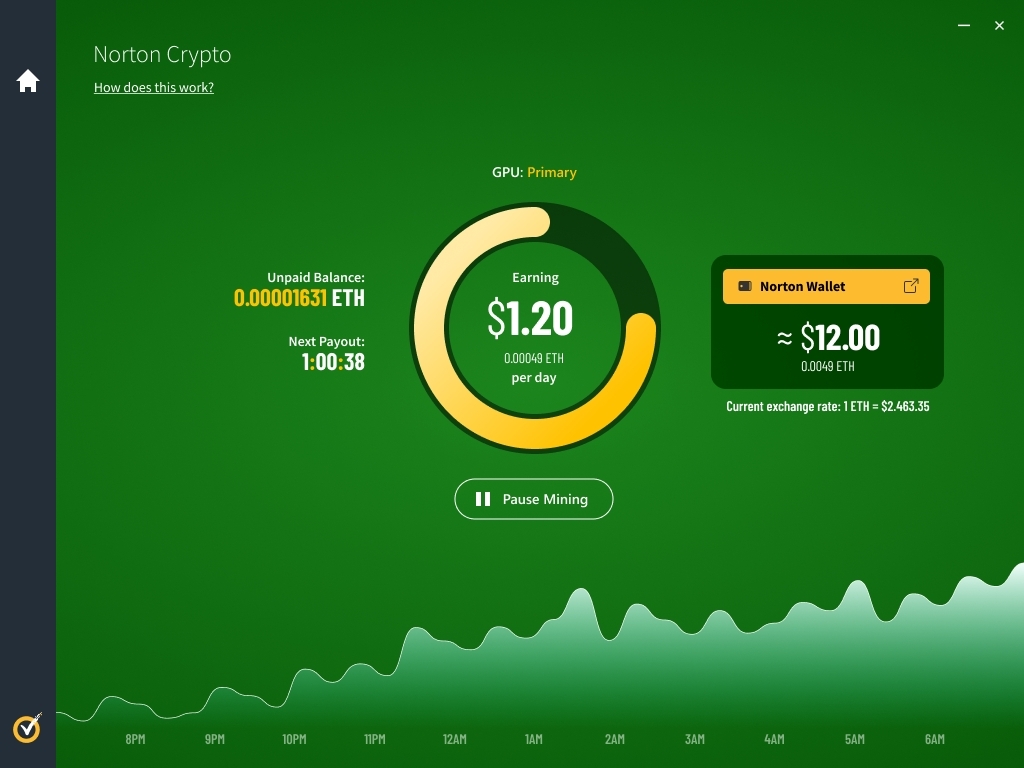NortonLifeLock announced yesterday that it’s adding Ethereum mining to its Norton 360 antivirus software with an upcoming feature, Norton Crypto, that “select Norton 360 customers in Norton’s early adopter program” are invited to test.
Let’s make this clear from the start: Enthusiasts will probably be better off learning how to mine Ethereum themselves instead of relying on Norton Crypto. The feature is likely intended for the kind of person who’s never heard of a hash rate, shopped for the best mining GPU, or wondered how to optimize their GPU for Ethereum mining. It’s worth considering how Norton Crypto is presented to those people.
“For years, many coin miners have had to take risks in their quest for cryptocurrency, disabling their security in order to run coin mining and allowing unvetted code on their machines that could be skimming from their earnings or even planting ransomware,” the company said in a press release. “Earnings are commonly stored directly on miners’ hard drives, where their digital wallet could be lost should it fail.”
Naturally, Norton positions Norton Crypto—and the accompanying Norton Crypto Wallet—as the solution to those concerns. The former is a mining tool built into antivirus software people already trust; the latter is a cloud-based solution to which people can transfer their earnings ”so it cannot be lost due to hard drive failure.” It’s not hard to see how the feature could appeal to the (barely) crypto curious.
Unfortunately we don’t have many other details about the feature. NortonLifeLock said Norton Crypto “is expected to become available to all Norton 360 customers in the coming weeks.” But at the time of writing, the company hasn’t updated its website to provide more information about how it’s monetizing the feature, how it’s securing the cloud-based wallet, or how the underlying mining process operates.
Those are important questions to answer. It’s already hard to mine Ethereum at a profit even on dedicated hardware; doing so on a basic system through a feature built into antivirus software would probably be even more difficult. Clearly explaining the increased energy costs, potential impact on the system’s performance, and the cryptocurrency market volatility probably wouldn’t be trivial either.
NortonLifeLock might also have to re-teach the concept of cryptocurrency to some of its customers. Right now, there are 10 results on the Norton website for “crypto.” Three are basic explanations of cybersecurity, cryptocurrency, and ransomware; three are about specific vulnerabilities, a malvertising campaign, or Cryptolocker; three are basic support articles; one is just a link to the Emerging Threats page.
Most of those results (and the pages they lead to) don’t exactly portray cryptocurrency in a positive light. That’s fair—cryptojacking is a serious problem. But it’s not hard to imagine there will be a certain amount of cognitive dissonance caused when people load the antivirus app that’s been warning them about malicious crypto mining for years suddenly offers to help them mine crypto.
We should know more about how people will react to Norton Crypto when the feature reaches all Norton 360 customers in the coming weeks, assuming everything goes as scheduled and as the first testers gain access to the feature.
